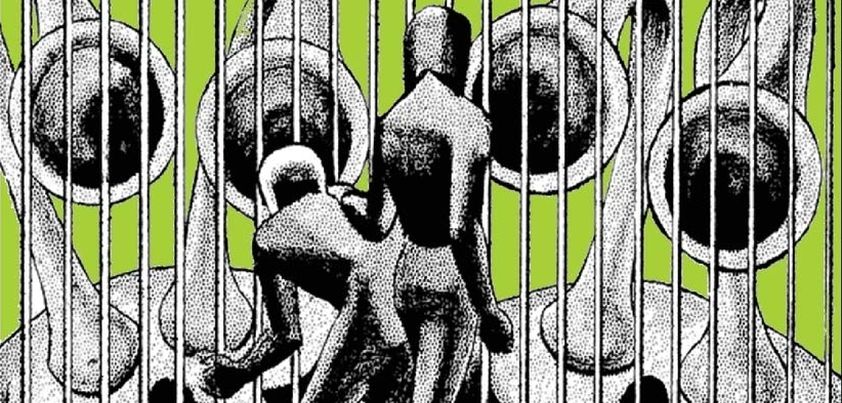 As is often the case with Isaac Asimov’s longer science fiction stories, Youth includes some profound “earthly” themes. Written in the early years of the Cold War, the first is the danger that atomic war poses to civilization. The second, which is strongly reinforced by the twist ending, is not to judge sentient beings (people) by their looks, no matter how strange they appear. A final theme, as reflected in the title and the Astronomer’s exasperated final exclamation (Youth!) is the naïve innocence of the young, and the responsibility that we as adults hold for their future. More…
As is often the case with Isaac Asimov’s longer science fiction stories, Youth includes some profound “earthly” themes. Written in the early years of the Cold War, the first is the danger that atomic war poses to civilization. The second, which is strongly reinforced by the twist ending, is not to judge sentient beings (people) by their looks, no matter how strange they appear. A final theme, as reflected in the title and the Astronomer’s exasperated final exclamation (Youth!) is the naïve innocence of the young, and the responsibility that we as adults hold for their future. More…
Archives
The Last Question
 In commenting on this story, Isaac Asimov once wrote: This is by far my favorite story of all those I have written. After all, I undertook to tell several trillion years of human history in the space of a short story…. I also undertook another task, but I won’t tell you what that was lest I spoil the story for you. Although there is very little character development or action, the ending is so powerful that almost everyone who reads it remembers it. Themes include technological change, the search for knowledge, entropy and the fate of mankind, religion (omniscience, creation). More…
In commenting on this story, Isaac Asimov once wrote: This is by far my favorite story of all those I have written. After all, I undertook to tell several trillion years of human history in the space of a short story…. I also undertook another task, but I won’t tell you what that was lest I spoil the story for you. Although there is very little character development or action, the ending is so powerful that almost everyone who reads it remembers it. Themes include technological change, the search for knowledge, entropy and the fate of mankind, religion (omniscience, creation). More…
The First Law
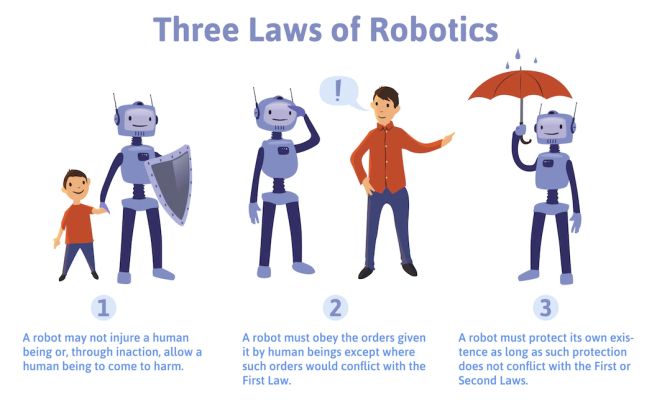 In this story by Isaac Asimov, a scientist tells astounded colleagues a “tall tale” about how a new model robot broke the first and most fundamental of the Three Laws of Robotics: a robot may not injure a human being, or through inaction allow a human being to come to harm. The malfunctioning robot had escaped from its base and, upon encountering the man in a deadly zero-visibility storm, left him to die. Although the robot had a legitimate reason for its actions, the model was discontinued immediately. Themes include disobedience, protectiveness and “motherly” love. More…
In this story by Isaac Asimov, a scientist tells astounded colleagues a “tall tale” about how a new model robot broke the first and most fundamental of the Three Laws of Robotics: a robot may not injure a human being, or through inaction allow a human being to come to harm. The malfunctioning robot had escaped from its base and, upon encountering the man in a deadly zero-visibility storm, left him to die. Although the robot had a legitimate reason for its actions, the model was discontinued immediately. Themes include disobedience, protectiveness and “motherly” love. More…
The Fun They Had
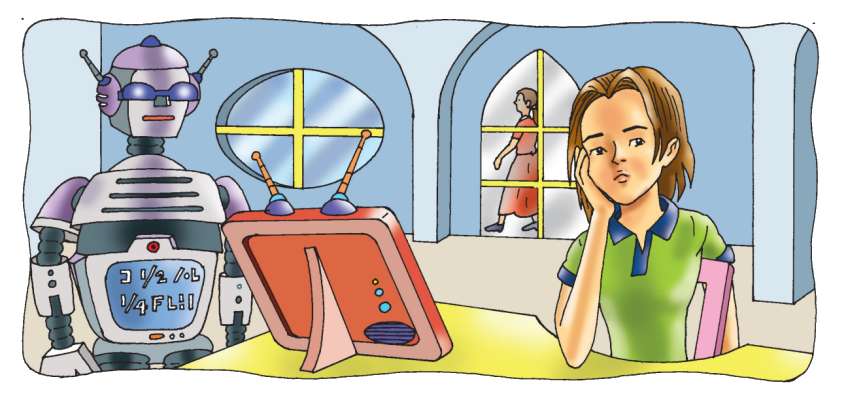 This story by Isaac Asimov is set in the year 2155. A boy shows a friend something strange he found hidden away in his family attic. Neither of them has seen one before… it is a book! First, they discuss how wasteful paper books were compared to electronic books of their day. The book is about school, and they go on to compare home schooling of the future with “going to school” in the past. Themes include technological progress, human connection (computer-driven vs. classroom learning), paper-based vs. electronic reading, memories, longing for aspects of the past. More…
This story by Isaac Asimov is set in the year 2155. A boy shows a friend something strange he found hidden away in his family attic. Neither of them has seen one before… it is a book! First, they discuss how wasteful paper books were compared to electronic books of their day. The book is about school, and they go on to compare home schooling of the future with “going to school” in the past. Themes include technological progress, human connection (computer-driven vs. classroom learning), paper-based vs. electronic reading, memories, longing for aspects of the past. More…
The Dead Past
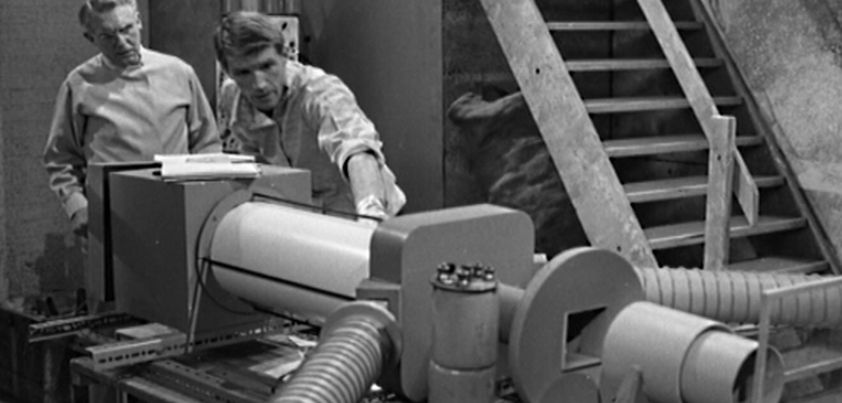 In this story by Isaac Asimov a young physicist, indignant at apparent government suppression of research in a fringe area of science, secretly builds a home “chronoscope” that can look back in time up to one hundred and fifty years. Too late, the government learns of this and tries to censor his work, pointing out the potential for his machine to destroy an important aspect of life everyone takes for granted. Themes include scientific curiosity and freedom, government disinformation and control (in this case for the greater good), privacy, guilt. More…
In this story by Isaac Asimov a young physicist, indignant at apparent government suppression of research in a fringe area of science, secretly builds a home “chronoscope” that can look back in time up to one hundred and fifty years. Too late, the government learns of this and tries to censor his work, pointing out the potential for his machine to destroy an important aspect of life everyone takes for granted. Themes include scientific curiosity and freedom, government disinformation and control (in this case for the greater good), privacy, guilt. More…
The Machine That Won the War
 This story by Isaac Asimov remains relevant today as technology plays an increasing role in controlling everything from military applications to crucial infrastructure. An inter-planetary war has been won, Earth is safe, and three men bask in the glory. Ironically, it wasn’t won by a machine or any of the three ‘experts’. It was won either by chance or because of problems experienced by the enemy. Pointedly, no thought is given to the rights and wrongs of the war, or the suffering on both sides. Themes include war, hubris, the fallibility of machine and human decision-making, chance. More…
This story by Isaac Asimov remains relevant today as technology plays an increasing role in controlling everything from military applications to crucial infrastructure. An inter-planetary war has been won, Earth is safe, and three men bask in the glory. Ironically, it wasn’t won by a machine or any of the three ‘experts’. It was won either by chance or because of problems experienced by the enemy. Pointedly, no thought is given to the rights and wrongs of the war, or the suffering on both sides. Themes include war, hubris, the fallibility of machine and human decision-making, chance. More…
Key Item
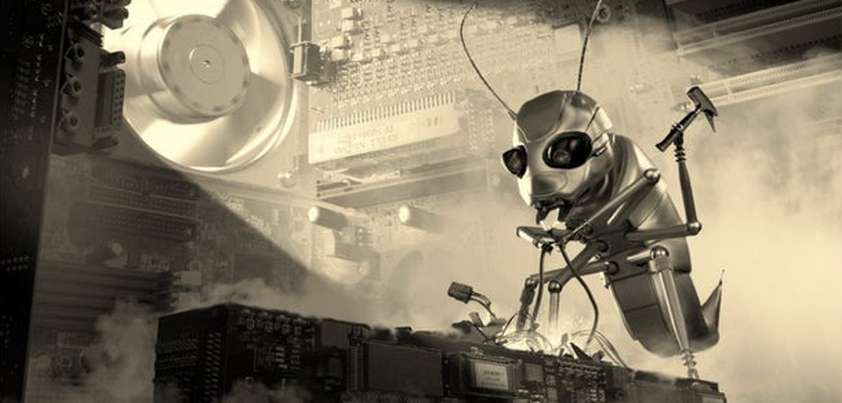 In this story, Isaac Asimov’s favorite supercomputer Multivac has a big problem. It doesn’t respond to commands, and isn’t following its built-in program to self-diagnose the cause. As the global economy depends on Mulitvac, this could result in panic across the world. Teams of technicians have been trying to identify what is wrong for three days. Finally, a scientist discovers the “key item” needed to fix the problem. It is a simple thing that we are all taught to use as children. Themes include the dangers of Artificial Intelligence and/or relying solely on technology, scientific hubris, good manners. More…
In this story, Isaac Asimov’s favorite supercomputer Multivac has a big problem. It doesn’t respond to commands, and isn’t following its built-in program to self-diagnose the cause. As the global economy depends on Mulitvac, this could result in panic across the world. Teams of technicians have been trying to identify what is wrong for three days. Finally, a scientist discovers the “key item” needed to fix the problem. It is a simple thing that we are all taught to use as children. Themes include the dangers of Artificial Intelligence and/or relying solely on technology, scientific hubris, good manners. More…
Nightfall
 As once described by Isaac Asimov himself, Nightfall (is) the tale of a world with eternal sun that is suddenly plunged into total darkness and utter madness. Hailed as one of the greatest Science Fiction stories ever written it tells how, in preparation for the potential end of their civilization, a group of forward-thinking scientists have created a safe place to store their world’s accumulated knowledge and hide a select group of “survivors”. Themes: science vs superstition (cultism), having the courage of one’s convictions, sensory deprivation, insanity, mob hysteria, scientific hubris. More…
As once described by Isaac Asimov himself, Nightfall (is) the tale of a world with eternal sun that is suddenly plunged into total darkness and utter madness. Hailed as one of the greatest Science Fiction stories ever written it tells how, in preparation for the potential end of their civilization, a group of forward-thinking scientists have created a safe place to store their world’s accumulated knowledge and hide a select group of “survivors”. Themes: science vs superstition (cultism), having the courage of one’s convictions, sensory deprivation, insanity, mob hysteria, scientific hubris. More…